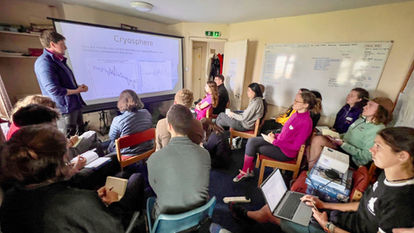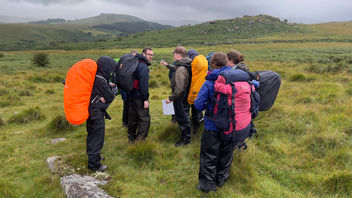
Pilot Year -
Clean Planet Peninsula
Pilot Year (2023)
The Clean Planet Peninsula project is a multi-year initiative to provide early career scientists with scientific research expeditions in the polar regions between 2024 - 2027.
In 2023, successful applicants undertook in a pilot year to prepare themselves for the future Arctic and Antarctic conditions and support in the project preparation.
The Clean Planet Peninsula project is created and supported by the Clean Planet Foundation- the pilot year was organised and run in collaboration with explorer Antony Jinman and the UK Polar Network.
You can learn more about the entire multi-year project and its impact right here, or see it featured by the BBC.
This page is specifically focused on the 2023 Pilot Year of the project.
Before sending the successful early-career polar scientist applicants to the Arctic and Antarctic for research expeditions, it's crucial to train them in both the theoretical and practical aspects of surviving and functioning in the polar regions. Many scientists may understand the research they need to gather, but not fully appreciate the unique skills required in the harsh environments found at the poles to bring back the data successfully.
The Pilot Year of the Clean Planet Peninsula project was focussed on selecting the polar scientists and then providing practical and theory-based training.
Quick Jump to:

Pilot Year - UK Training (2023)

Our Pilot Year Early-Career Scientists
DARTMOOR TRAINING 2023
A group of 20 scientists and researchers were selected from a pool of over 400 interested, and invited to Dartmoor in August 2023 to undertake polar training.
All successful applicants needed to be undertaking key research projects where data from future polar expeditions could support their theses.





Criteria for Selection
The target audience for the course was early career polar researchers based in the UK. To be eligible for the course applicants must have been:
-
Within five years of completing the most advanced degree.
-
Work on or study the polar regions.
-
Have upcoming (in the next 12-18 months) polar fieldwork, or have untapped opportunities to undertake polar fieldwork through their work or study.
-
Have previously not completed fieldwork training in the last 12 months.
To apply for the pilot year applicants must have demonstrated the following:
-
A vested interest in polar science.
-
Show how the course will open up fieldwork opportunities to them in areas of their interest.
-
Understand the skills they will gain as a result of attending the Course.
-
Demonstrate the ways in which they will put into practice the skills acquired.
-
Let us know how the course will impact their career and future goals.
-
Have previously not completed fieldwork training in the last 12 months.
Demographics of Selected Applicants

ethnicity
research


employment
GENDER
Our Pilot Year Scientists hailed from all over the UK...
Scientific Research
The selected early-career research scientists (ECRs) are undertaking projects to gather data from the polar regions and prepare them for the extreme conditions. Our ECRs are undertaking the following research:
-
How organisms adapt to extreme environments (such as microplastics)
-
How climate change affects Arctic species and their reliance on sea ice.
-
Observations and models to study atmospheric gravity waves, using satellite data and fieldwork.
-
Effects of Greenland Ice Sheet melting on the Atlantic Meridional Overturning Circulation.
-
Improving near-term projections of Arctic climate change using comprehensive climate model output.
-
Studying the effects of climate change on ice conditions, wildlife, and sea levels in polar regions.
-
Studying the microbiology of subglacial lakes, collecting samples from depths of up to 2 kilometres.
-
How glaciers change over time by examining water flow, measuring ice and snow layers.
-
Studying bacteriophage diversity in the polar regions to understand the impact of climate change.
-
Undertake AI and Radar Data Analysis for Snow Thickness Measurement.
-
Use of drone technology to gather high-resolution images of different ice conditions in Antarctica.
-
How life adapts to cold environments, particularly focusing on Antarctic and temperate fish.
-
How human interaction impacts seabird conservation in remote and largely uninhabited Polar areas.
-
Remote sensing of Arctic flora and fieldwork


Pilot Training
The Clean Planet Foundation’s mission is to educate and take action for the sustainable use of plastics, and reduction of carbon emissions.
A not-for-profit organisation.
The Clean Planet Peninsula project's theoretical and practical training was conducted by explorer and educator Antony Jinman and the UK Polar Network. Their goal was to educate early career scientists on both the theory and practical skills required for conducting exploration and research in the polar regions.
Course Modules
Pilot Year Course Leaders
Clean Planet Foundation
Organiser & Lead Sponsor
The Clean Planet Foundation (CPF) educates and takes action for the sustainable use of plastics, and reduction of carbon emissions. A not-for-profit organisation.
We believe that everyone deserves better, and provide community funding, sponsorship, investments and initiate flagship projects to mitigate the impact of the plastic and climate crises across the UK and beyond.
The Clean Planet Foundation is part of the Clean Planet Group which also builds technologies and infrastructure to remove hard-to-recycle plastic waste from the environment, and convert it into circular products.



"[The Clean Planet Peninsula Project] is delivered as part of an overall survival skills course on Dartmoor, Devon.
It is the first step in a four-year programme aiming to take 16 participants, all in their 20s and selected from across UK universities, on polar expeditions.
This cohort is largely women, with participants hoping to redress the historic gender imbalance."
Harriet Bradshaw, Science & Climate Journalist, BBC
Reporting on-site from the Clean Planet Peninsula Project
ACROSS THE
BBC Climate & Science reporter Harriet Bradshaw joined the Clean Planet Peninsula team on Dartmoor (UK) in August 2023.
Her written, and audio and video report was front-page across the BBC network- including BBC Breakfast, BBC News, BBC One, BBC Online, BBC Social, BBC Radio and BBC Spotlight. The report focussed on the importance of the project on environmental issues, with a specific focus on project coordinator, Ellie Honan's, course on female health in the polar regions.

BBC Breakfast, the flagship morning show for the BBC included a long feature about the Clean Planet Peninsula Project.
"A group of young scientists with ambitions to do polar research, are spending a week on Dartmoor (UK) to learn survival skills. Let's see how that translates..."
- Naga Munchetty,
BBC Breakfast Presenter

Clips and logos © BBC. No wider endorsement by BBC implied. For reference only. Full Disclaimer
BBC News output multiple bulletins on the Clean Planet Peninsula project, including an interview with project coordinator, Chloe Nunn.
"Polar exploration has long been a male dominated field, but now women are acting on their dream... a new four year programme has been launched to take a group of mostly women to explore the polar region."
- BBC News

Clips and logos © BBC. No wider endorsement by BBC implied. For reference only. Full Disclaimer
BBC One's lunchtime and evening news featured a new cut and perspective on the UK Peninsula Project.
"Early career scientists with dreams of one day researching in the Arctic or Antarctic has started a four week programme aimed at taking them to the polar regions. Training has begun with a week long survival course on Dartmoor."
- BBC One

Clips and logos © BBC. No wider endorsement by BBC implied. For reference only. Full Disclaimer
BBC Online featured a stand-alone piece, focussed on the key healthcare workshop of the Clean Planet Peninsula Course. The article headlined the Science, Technology and 'Must See' sections of the BBC website.
"You're tied to co-workers, on a glacier, in icy conditions, and then you realise… it's that time of the month. What do you do?
Dealing with your period during fieldwork in the Arctic or Antarctic can be a challenge.
And yet talking about menstruation has remained taboo..."

Front page of the Science & Technology Sections.

Front page of the Science & Technology Sections.

Front page of the Science & Technology Sections.

Front page of the Science & Technology Sections.
click image to expand
Clips and logos © BBC. No wider endorsement by BBC implied. For reference only. Full Disclaimer
BBC regional news stations featured the Clean Planet Peninsula Project as part of their daily coverage.
We have here a clip from BBC SPOTLIGHT, the regional news station for the South West - specifically covering the Dartmoor area.

Clips and logos © BBC. No wider endorsement by BBC implied. For reference only. Full Disclaimer

The BBC World Service radio programme, Health Check, included an extended feature on the Peninsula Project.
The piece focussed on the workshop undertaken by UKPN's co-president & project coordinator, Ellie Honan, whilst onsite in Devon.
Clips and logos © BBC. No wider endorsement by BBC implied. For reference only. Full Disclaimer
The BBC News' TikTok channel ran a great animation, made by Helen Bradshaw, about the challenges of female menstruation whilst on a polar expedition. Watch it on our website, or see it on the BBC News social channels.
Clips and logos © BBC. No wider endorsement by BBC implied. For reference only. Full Disclaimer

Pilot Year (2023) Gallery































































